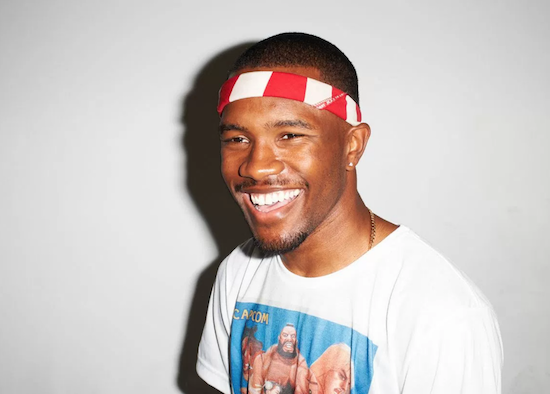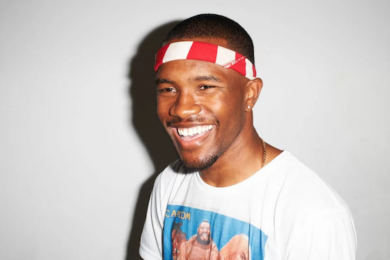When Frank Ocean finally stepped on the stage at Lovebox this year and started his set with ‘Solo’, a wave of high-energy rowdiness swept the 50,000-person crowd. It wasn’t the type of energy you’d expect for such a slow, echoey song – but it perhaps occurred because he was almost 30 minutes late, and because Ocean is known for cancelling his festival slots – twice in May alone (FYF and Primavera) often with only a vague statement about “production delays”. Though festivalgoers are often irritated (a woman behind me angrily yelled about the £125 she spent on festival tickets solely to see Ocean), it’s also indulged as a quirk of character, part and parcel of his talent. Ocean is considered a genius who strings along his audience with fake release dates, unreliable performance schedules and an internet presence consisting of vague tumblr posts and media blackouts.
We can consider it as genius because when he finally does release an album, like last year’s (delayed) Blonde, it is always worth the wait. But although he is received with more patience than many artists would be, Ocean is also treated with an entitled kind of obsession – something that values him as an artist but not as a person, despite how vulnerable he has made himself to his listeners. It was a theme of the day – I watched a pack of white women get into a fight with a group of black women for being “too into it”, “loud”, and “unladylike” with their dancing at Solange’s show, for example, and a group of coked-up twentysomethings made fun of a gay couple in the Frank Ocean crowd – people too often love how the artist sounds but don’t have respect for the substance of what they convey. It’s a lack of connection that crosses genres: how many young people do we know that love Kendrick Lamar but turn a blind eye to police brutality, or who will watch Brian Wilson sing his heart out but still have little respect for people struggling with mental illness?
Artists can convey vulnerability without always being vulnerable, can unload their most sensitive moments and also carry that sensitivity with pride. After Frank makes us cry to ‘Bad Religion’, he turns around and wins Album of the Year for Channel Orange, and withholds Blonde from Grammy consideration. But it’s also likely that this vulnerability plays some role in his compulsive flakiness, and his audience’s often blatant disregard for his mental health is alarming. Frank Ocean might be just as manipulative or as much of a perfectionist as we make him out to be, but that’s beside the point: the way we receive him is symptomatic of the way many of us commodify musicians, enjoying their artistry with little respect for their humanity.
Being an artist who owns their vulnerability is a hard task but an important one, not least because it sends a strong supportive message to listeners who are insecure for the same reasons. But when the artist’s intent is glossed over, ignored or used against them, it perpetuates a toxic cycle for both the musician and their biggest fans. With Frank Ocean, it can lead to an invalidation of his identity as a bisexual black man and it can encourage a disregard for people’s mental health. When an artist like Ocean exhibits such public flakiness and we don’t know if it’s a media ploy or stemming from insecurity and self-doubt, it’s especially concerning. After all, Chance the Rapper recently said in an interview with Complex magazine that “no one really is able to find Frank when Frank goes away. Like literally no one, not just publications”.
Frank Ocean’s stage was mostly bare, with nothing but his musicians, their equipment, and a DJ stand on the main part of the stage. A runway through the middle of the crowd had a large stack of vintage-looking cream speakers and a futuristic hole-punched chair. He spent his set walking the stage, often with eyes closed and shaking his head. A flurry of videographers danced around him, responsible for the split-screen live projections. They didn’t simply film him so he was visible for those of us in the back – this was in a documentary style, zooming in on his shoes or the chicken scratch and stickers pressed into his runway platform. The effect was twofold: it emphasised Ocean’s A-list status by making him appear larger than life, and it made him look incredibly lonely, avoiding eye contact with the cameras and standing with a dejected hunch. The cameras’ up-close shots of stagehands or from behind the DJ computer screen made you feel like you were on stage with him, with the frightening pressure of having 50,000 people watching your every move.
As he paused to go into ‘Thinking Bout You’ (his only mic break the whole show), he nervously uttered ‘I haven’t done this a lot in a while…’ but ‘thanks for coming out here and fucking with me’ before beginning the song, asking to start over, and then singing it twice through. Whether Frank’s behaviour was all an act or not it does not matter: he was sending a message of humility, and of vulnerable, pure artistry, that was hard to even hear among the mix of irritated or drunkenly ecstatic picture-taking that could only be shut up by the singing of his biggest hit.
Frank Ocean was unable to finish his set, cut off after his song ‘Nikes’ because of the festival’s 11pm sound curfew. Whether this was the fault of the festival, Ocean, or his team, I cannot say. When I think of Frank Ocean the person, I think of his heartfelt tumblr confessional on the first person, a man, that he ever loved. “Whoever you are. Wherever you are… I’m starting to think we’re a lot alike. Human beings spinning on blackness. All wanting to be seen, touched, heard, paid attention to… So thank you. All of you. For everything good. I feel like a free man. If I listen closely.. I can hear the sky falling too” It’s the same, sadness-tinged but quiveringly beautiful attitude he presents himself with on stage. He’s a closely watched celebrity and beyond that he’s a human being, with the decency to not let it go to his head and the vulnerability to speak from the heart. But all I could hear around me were people upset that he came on too late to finish, or that he didn’t play ‘Forest Gump’.



